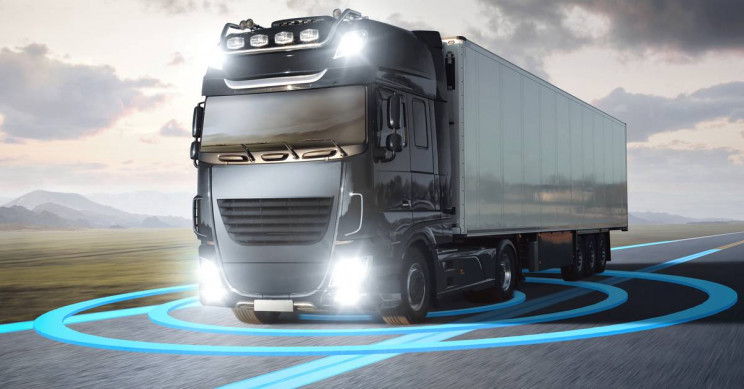123Fab #34
1 topic, 2 key figures, 3 startups to draw inspiration from

Breakthroughs in the field of autonomous vehicles, including for freight, have leaped forward in recent years. In October 2020, Swedish startup Einride unveiled a new driverless vehicle for autonomous freight, which the company hopes to see on the road this year. Last year, Plus.AI completed its first coast-to-coast commercial journey across the US with an autonomous truck, using simultaneous localization and mapping (SLAM) technologies. Indeed, a combination of factors has been fueling this development, including the increasing road freight (with 11,000 bn ton-km today, it is expected to double over the next 20 years) and the shortage of drivers (a lack of 175,000 drivers by 2024, according to the American Trucking Association).
In this respect, the European Commission launched in December 2020 a 29-partner consortium – All-Weather Autonomous Real Logistics Operations and Demonstrations (AWARD) – to shake up transport for the freight industry, and in particular, “operations in difficult weather conditions”. Led by EasyMile, this 3-year, €20 million project brings together truck manufacturers, equipment manufacturers, end-users and logistics operators.
While institutions are beginning to support autonomous freight, innovation and new technologies are the playground for startups and established automotive players. Innovations can be split into four main areas: sensors such as cameras or lidars (which provide data to a trained computer), computing hardware (responsible for autonomous driving calculations and decision making), storage infrastructure (to store data, on the edge and in the cloud, for future analysis and algorithm improvement) and autonomy software (which ultimately takes all the decision). If the range of technologies is similar to that of autonomous cars, long-distance trucks are better suited to test automated driving because of their extensive use of highways – where unexpected situations are less likely to occur than on urban roads – and the repetitiveness of their itineraries.
Startups at the wheel, which work on more or less autonomous trucks, include:
- US start-up TuSimple, a developer of autonomous driving technologies applied to trucks. It already has partnerships with two OEMs (Navistar and VW’s Traton truck OEM) and plans to reach Level 4 autonomy (trucks able to operate without a human driver under limited conditions that may include the time of day, weather, or pre-mapped routes).
- Otto, which was founded by former Google, Tesla, and Apple employees, is developing software to be installed on existing trucks to make them fully autonomous.
- Embark Trucks has already commercialized fully automated semi-trucks and trucks (used by Amazon for some loads).
Automotive and logistics players are also following the trend:
- Daimler Trucks signed a partnership with Waymo last October to deploy autonomous SAE L4 technology. They will combine Waymo’s cutting-edge automated driver technology with a unique version of Daimler’s Freightliner Cascadia, which will be commercialized in 2025.
- In 2016, a fleet of semi-autonomous Scania trucks (a Swedish manufacturer specializing in heavy vehicles) completed a journey from Sweden to the Netherlands using a technique called platooning, in which one driver pilots the leading vehicle while the rest follow along automatically (such as the one developed by Peleton Technology)
- Walmart announced last December that it would test driverless autonomous delivery trucks with startup Gatik from 2021. The trucks are equipped with sensors and autonomous driving software. To limit the risks, they have decided to start driving on the same and registered routes (mainly between warehouses and supermarkets).
The recent and on-going acceleration in autonomous freight vehicles is due to the many advantages they provide. 45% reduction in exploitation costs (McKinsey), better utilization (they operate 24/7 without driver rest periods), and a higher payload of trucks (as there is no driver cabin anymore). Moreover, it improves drivers’ conditions (avoiding night drives, more rest thanks to driving assistance). Finally, autonomous vehicles contribute to higher road safety (security systems should avoid 90% of crashes caused by human error) and a reduction of carbon footprint thanks to methods like platooning or IoT to optimize fuel consumption.
Nonetheless, several challenges or competitive alternatives remain. The impact on jobs is difficult to assess, due to the higher demand and need for monitoring of self-driving trucks. Autonomous fleets face autonomous trains which have higher productivity. One could see an opportunity for railway companies to integrate automated trucks. They could increase speed and throughput as well as secure a critical role in the overall ecosystem. Finally, as with autonomous cars, regulations need to be harmonized between countries, and the issue of liability is essential for further deployment.
To conclude, the market is growing fast and innovations are multiplying, which will likely lead to a technology transfer to other autonomous devices (cars, machines, robots, etc.). Institutions and key players, as Uber does, still need to work on driverless vehicle and regulation issues.
2 Key Figures
30 self-driving truck technology-provider startups
registered by Tracxn
Market size expected to reach $2.01bn by 2027
The market size of autonomous trucks is expected to reach $2.01bn by 2027, a CAGR of 12.6% from 2019
3 startups to draw inspiration from
This week, we identified three startups that we can draw inspiration from: Plus.ai, Kodiak Robotics, and Boxbot.

Plus.ai
Plus.ai develops self-driving technology for trucks. It offers solutions like the 360-degree perception that uses radars, LiDARs, and cameras for sensing. Their localization & mapping algorithms accurately track the location of trucks and detect and analyze road structures, and predict the behavior of other on-road vehicles.

Kodiak
Kodiak Robotics is a developer of self-driving trucks. It develops autonomous trucks with a full-stack solution with simulation enhanced system to optimize the risk. Their fleet of self-driving trucks ahave been tested in California and are currently operating in Texas.

Boxbot
Boxbot is a developer of automation technology designed to address the last-mile issues in logistics, enabling businesses and individuals to optimize the experiences of suppliers and consumers.
